Year 12 Common Module Study Guides
Learning methods available
Select a year to see available courses

You’re a month out from your HSC and the reality is starting to sink in – I have to get HSC ready in 28 days! ??? Should you panic? No! Instead, you have to get organised and plan for success. To help you, in this guide, we’re going to tell you how to identify your weaknesses, plot a course to success, and action it with a 28-day plan!
Download a Study Planning Kit. Ace your HSC.
Are you ready? Well, buckle up! We’re going to get you HSC ready in 28 days!
In this article, we’re going to explain to you how to assess strengths and weaknesses to formulate your plan in 5 steps,
With 28 days to go, we don’t have time to muck about. Let’s get planning.
The first thing you’ve got to do is assess where you’re at. This is the hard bit.
You need to honestly reflect upon where you’re at what and what you’re nailing and what you’re not!
However, this is easier said than done. How does one accurately and effectively explain where they’re at?
What you need to do is follow a process! And we’ve broken it down into 5 accessible steps.
Read on!
By now you know what you want to study and you’ve put in for places at several degrees. But what do you need to achieve to get there?
Now’s the time to double-check the entrance requirements for your degree. Check out the UAC website, and search up your course.
Then, pick the course you’re aiming for and check the ATAR entry requirement for the previous year:

Next, you need to use an ATAR Calculator to tell you what marks you need to achieve the ATAR for that course. The Matrix ATAR calculator (powered by Learnable) will tell you what marks you need to achieve the ATAR you for admission to your course.
You need to use this report to focus your efforts. You need to assess what marks you need and where you are at.
But how?
The AIR report from the Matrix ATAR calculator breaks down your subjects to show you the marks you need and the potential scaling (based on the previous years’ ATARs) that those subject might accrue.
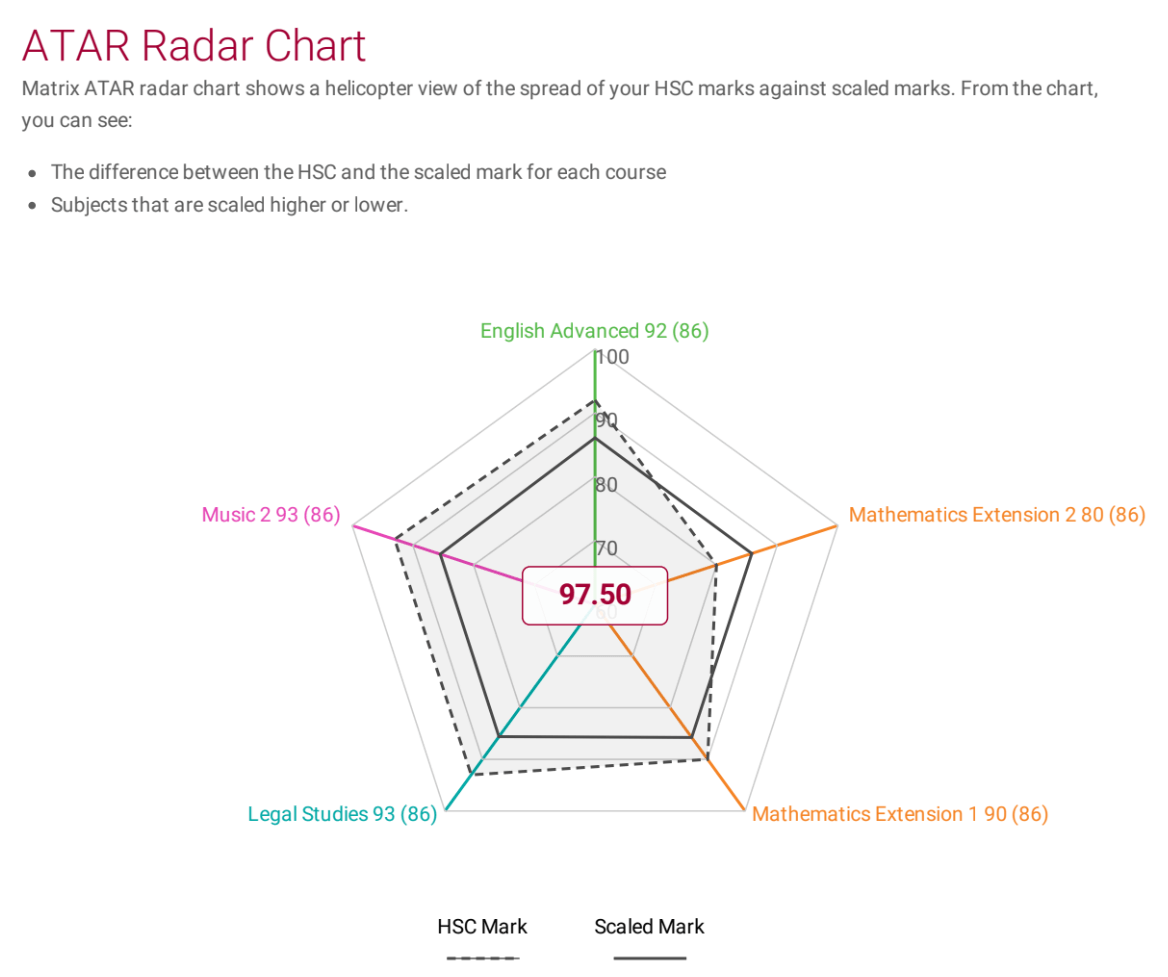
This report will give you an indication of where your efforts are going to be most effective. You can target the subjects that are going to see the most significant scaling for your HSC mark.
The ATAR boost report is especially useful for this as it will show you which of your subjects will receive the most and least amounts of scaling.
For example, English is compulsory and English Advanced receives a scaling bump for higher achievers:
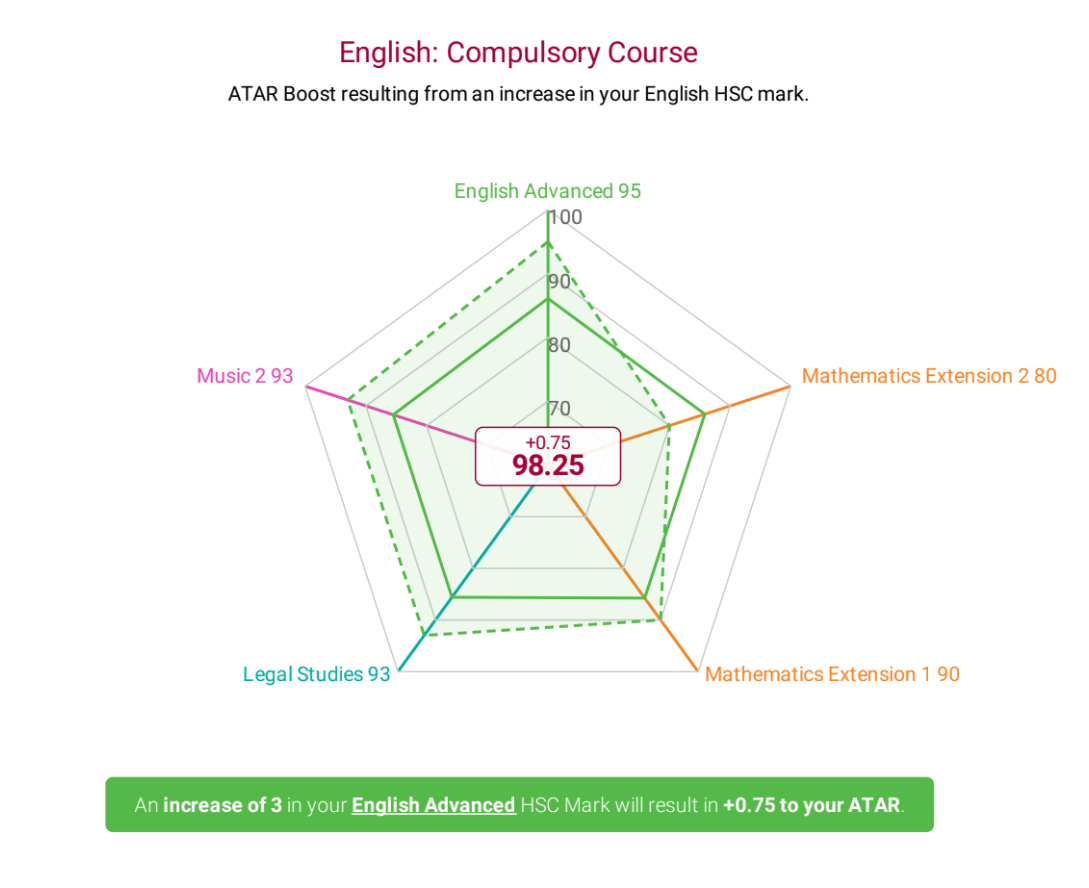
The ATAR Boost report can help you focus your efforts on subjects that will be rewarded with the higher proportion of scaling:
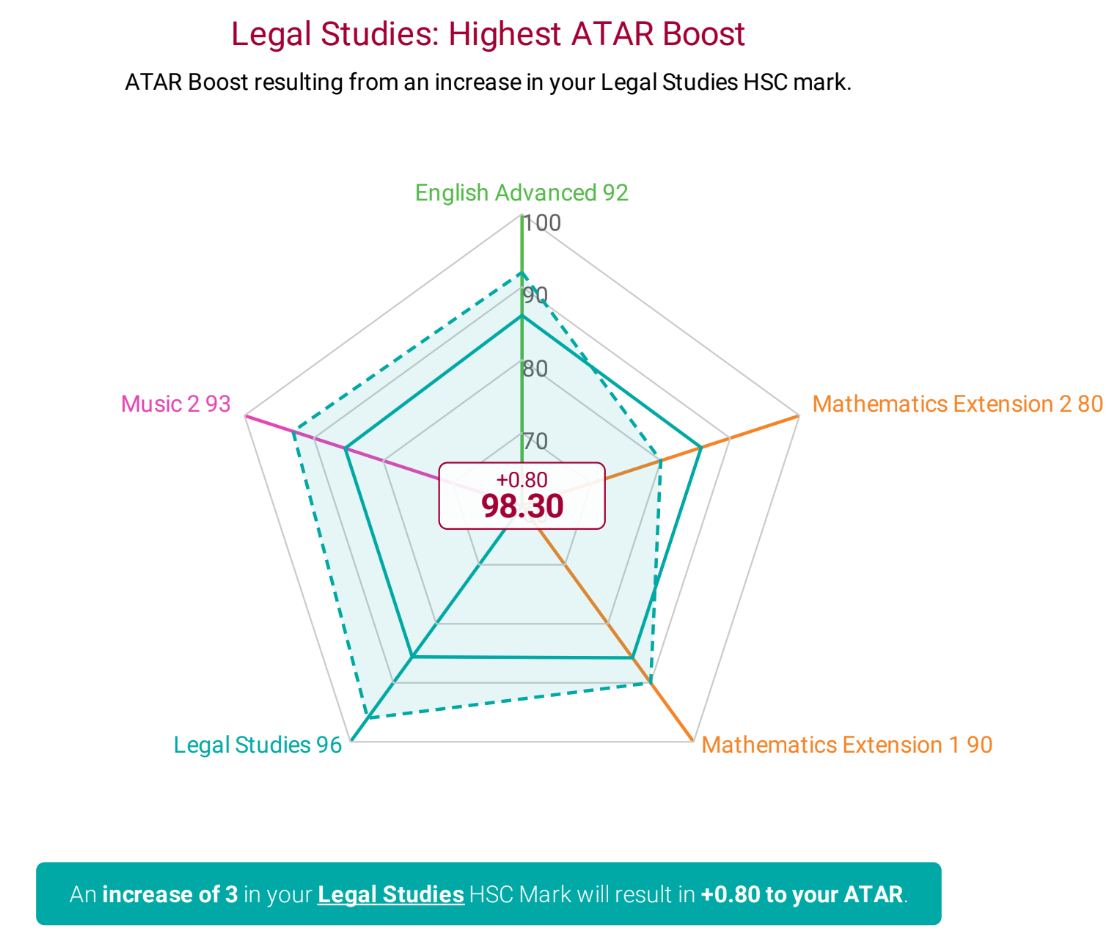
The final part of the AIR Report breaks each subject down by mark and provides actionable advice for how you can improve your marks.
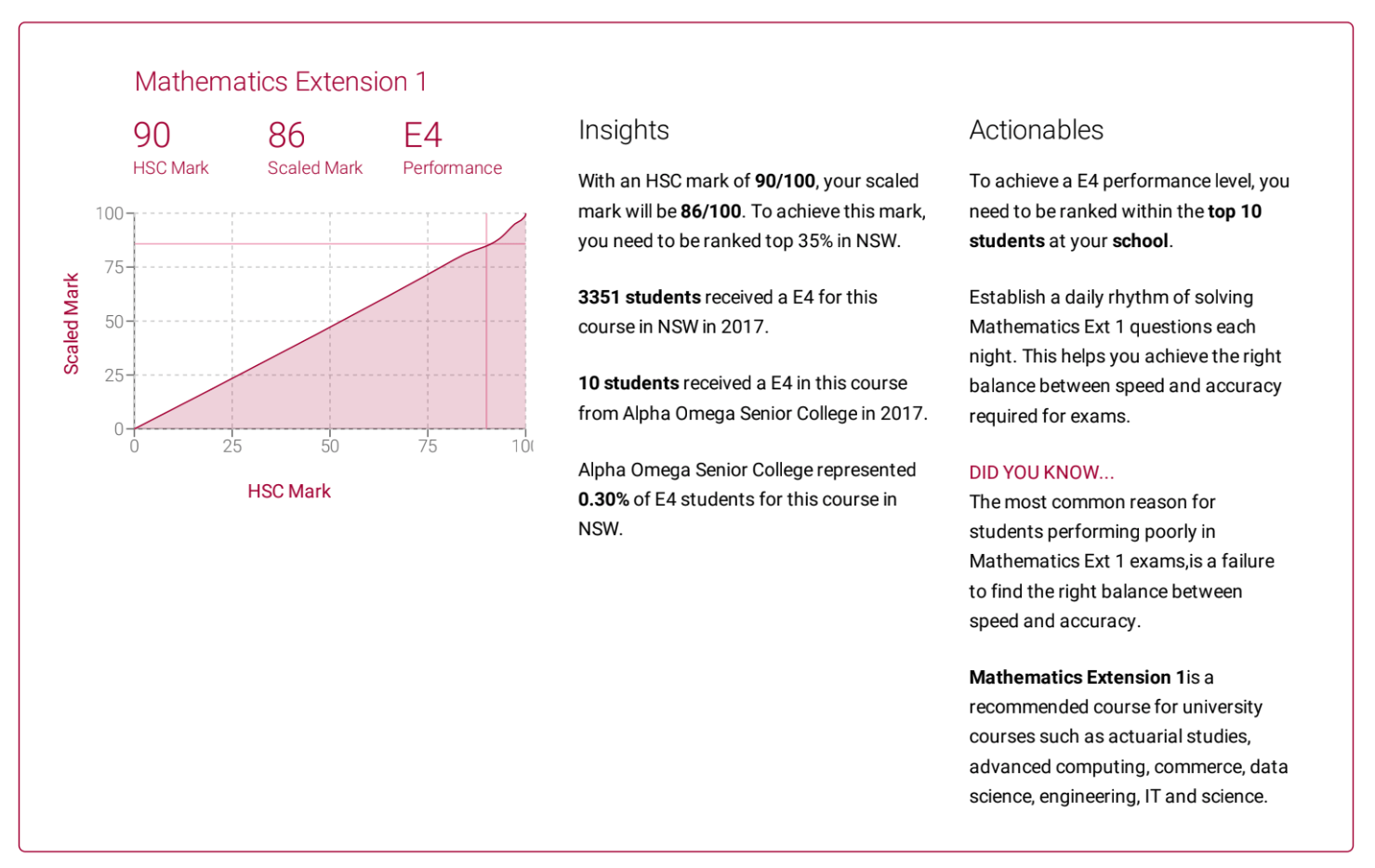
Take the time to study all of this information. You especially want to note down what your current mark is and what the mark you need for the HSC is. The discrepancy between these will help you plan your next steps. Let’s look at how to do that.
Revise your years content in 6 Days to get yourself HSC ready! We will go through the content, share exam taking tips and provide you with a wide variety of practice questions for you to do. Learn more about our HSC Exam Prep Course now.
Start HSC English confidently
Expert teachers, detailed feedback, one-to-one help! Learn from home with Matrix+ Online English courses.
To progress and consolidate, or save, your subjects for the HSC, you need to appraise your current position.
This means rating your subjects for how you’ve succeeded.
First, grab your final school report and see where you sit within your class. What is your rank for each subject?
You want to rank your subjects according to where you sit in the cohort. For the subject where you have the highest internal rank, give it a 1. For the subject with the lowest, give it a 5 or 6 depending on how many subjects you’re taking.
Next, go through the syllabus (you can find all the HSC syllabuses here on the NESA website) for each subject and rate each dot point syllabus depending on your confidence level –
Tally these up and figure out your average confidence for each subject. For example, if for Maths Ext 1 you mostly rated yourself as B confidence and it is your 2nd best subject with a rank of 5/60 you’d rank that as 2B.
Once you’ve ranked yourself for each subject, you need to see what subjects are going to get the biggest return investment on effort. To figure this out, we’re going to use the AIR report’s Boost and subject reports to see which subjects get the largest scaling hit.
What does this look like?
Okay. Let’s see how we can do this:
List your subjects from strongest to weakest – 1-5 or 1-6, etc.
What is their scaling like – good, neutral, poor? Note this, it will help you determine what to focus on. Use your AIR report to determine which subjects have the best cost (hours invested)/benefit (return in marks) outcomes.
Label them in terms of urgency – most urgent (need to make up ground), Least urgent (need to maintain marks).
Let’s look at a case study to see how this works.
Selma wants to study a Bachelor of Engineering (Hons) (Civil) / Bachelor of Surveying at the University of New South Wales (UNSW).
Her current trajectory after HSC Trials sees her at:
| Table: Selma’s current and required marks for the HSC to get an ATAR of 93 | ||
| Subject | Current (pre-HSC) mark | Required Mark (according to ATAR Calculator) |
| English Extension | 40 | 44 |
| English Adv | 80 | 88 |
| Maths Ext 1 | 39 | 41 |
| Maths Adv | 91 | 89 |
| Chemistry | 88 | 85 |
| Physics | 86 | 84 |
| ATAR Estimate | 90.55 | 93 |
Selma needs to add an additional 2.5 points on her ATAR. Selma can use the ATAR calculator to reverse engineer what she should be scoring on her weakest subjects by toggling the scores:
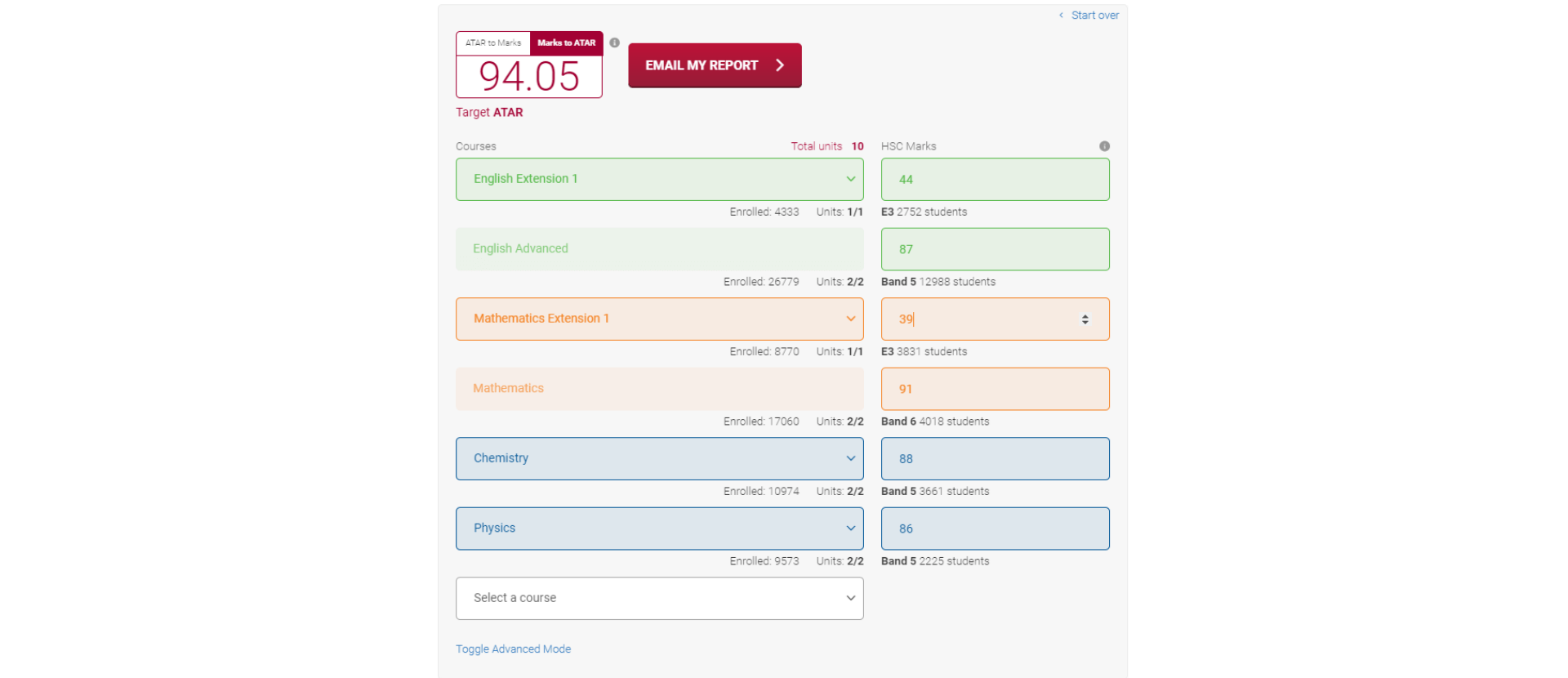
Selma then reads her AIR report to see what subjects are going to help her find the biggest gains if she focuses her final efforts on them.
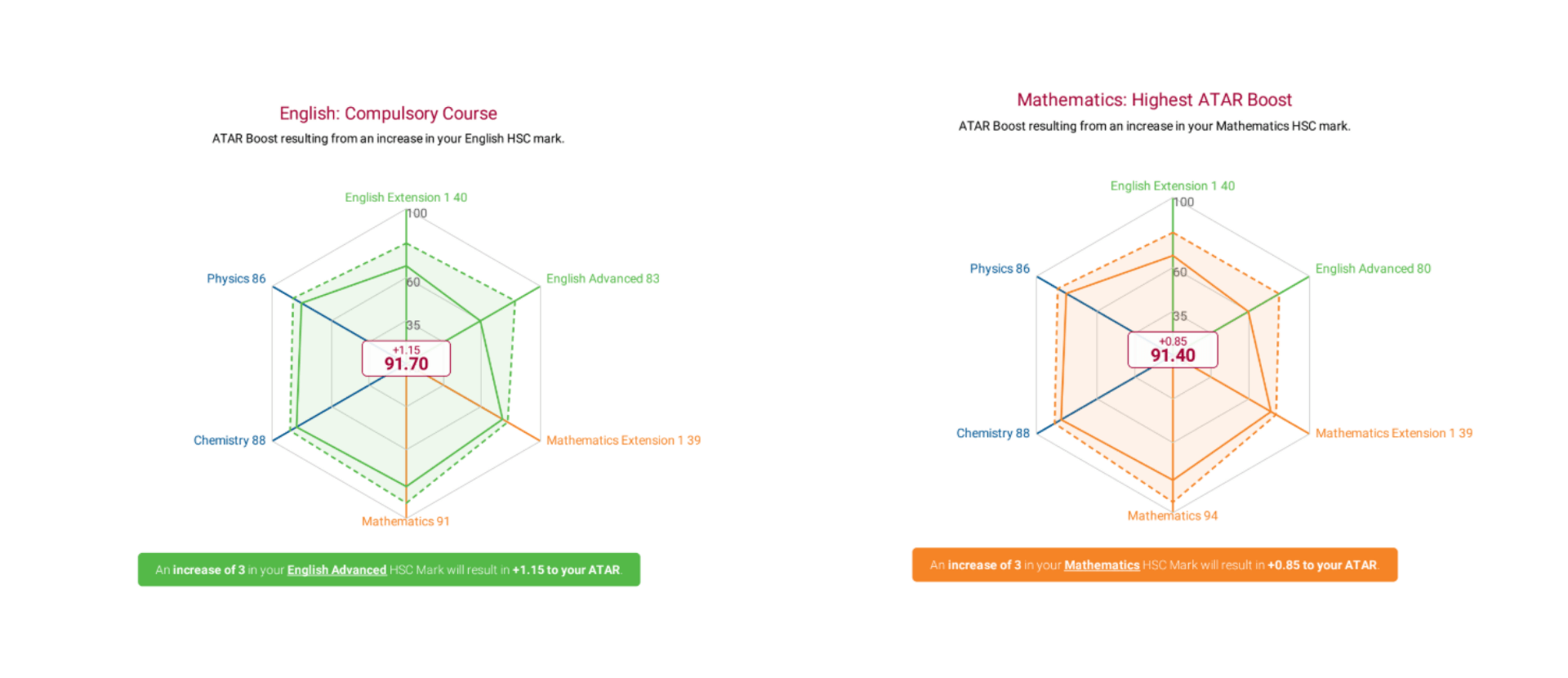
Selma realises that she needs to improve by 4 marks for English Advanced, 2 for Maths Advanced, 2 marks for Physics, and 1 for Chemistry. As Maths Ext 1 accrues the lowest scaling, she just needs to maintain her score and similarly, she just needs to hold steady with her Ext 1 English mark as the scaling for the other subjects is better.
Selma plots all of this data into a table and also ranks all of her subjects:
| Table: Selma’s current and required marks for the HSC to get an ATAR of 93 | |||
| Subject | Subject Rating | Current (pre-HSC) mark | Required Mark (after calculating best efficiency) |
| English Ext 1 | 5 B | 40 | 40 |
| English Adv | 4 C | 80 | 84 |
| Maths Ext 1 | 6 B | 39 | 39 |
| Maths Adv | 1 A | 91 | 93 |
| Chemistry | 2 B | 88 | 89 |
| Physics | 3 C | 86 | 88 |
| ATAR Estimate | 90.55 | 93.25 | |
So Selma has ranked her subjects as:
Using this process, Selma can now hone in on what subjects are her priorities, in terms of urgency and effort:
Selma now has her targets and is ready to timetable her next 30 days to make sure she gets into her degree. It’ll be a bit of hard work, but it’s totes going to be worth it!
Now you want to do what Selma has done, analyse your subjects and marks and identify the importance of your subjects!
Have you done that, now? Good. Let’s allocate your time!
Before you can timetable your life away, you really need to know how much time you have and how much time you can allocate to your efforts. In the 4 weeks leading up the HSC, you have to figure out how many hours a day you can study and then decide how much of that you need to allocate to each subject.
Remember, just because you need to improve some marks doesn’t mean you can neglect the subjects you only need to maintain.
The first thing you want to do is jot down your HSC exam dates in your calendar. Ideally, you want to have a big wall calendar that you can pin above your study space you’ve got a constant reminder of when your exams are.
Next, you need to figure out the available time that you have. This means deciding:
To make these decisions, you need to be as realistic as possible. You might think that studying 12-hours a day for a month is an effective plan to start with, but the truth is that’s a terrible idea.
Effective study means working to maximum efficiency and retention. 12 hours a day revising, writing, and doing practice exams isn’t going to help you retain or learn a huge amount of new information.
If you think about the structure of school, you spend 6 hours a day on-campus and probably do 2 – 3 hours of study off-campus. That equates to about 7-8 hours of learning each day. This works for the vast majority of students. Yes, there are outlier who score high ATARs who study less or more, but this is a good benchmark.
After all, 7 – 8 hours of effective study is going to be much more efficient than 12 hours littered with distractions or brain fades where your mind stops retaining information.
You don’t go to school 7-days a week, so, similarly, you should be cautious about studying every day for 4 weeks. Instead, you should strive to have at least one day off each week. You don’t want to hit the HSC exhausted!
A good aim is to study for 5 full days and maybe do some light revision over the remaining day. If you do have the irrepressible urge to study 7 days a week, make sure that at least two of those days are shorter days with plenty of breaks and R&R.
Considering this, the average Matrix student in STUVAC studies for 5 X 7-8 hour days and does one shorter day of 3-4 hours with one day off.
\( (5 \times 8) + 4 = 44 \ \text{hours a week}\)
Your individual goal might change, but 44 hours a week isn’t an unreasonable target.
Now what you need to do is figure out how much of that 44 hours you can allocate to each subject. But, how do you do this?
Well, you need to take into account:
Fortunately, you’ve ranked your subjects already. Now you’ve just got to assign the time to it for each week.
It might seem straightforward to say, “I’ve 10 units, so I’ll just divide my 44 hours by 10 and spend 4.4 hours a week on each unit!” And, this isn’t a terrible idea, but it is not as effective as it could be.
Instead, you want to target your units according to their need and urgency. We’ve already considered need in Step 3, above, but what’s meant by urgency?
Well, while the HSC might be a month away, not every subject is on the same day. Instead, they’re spread over 4 weeks. For example (from the 2020 HSC timetable),
What does this mean? Well, it means you can plan your 28-day study timetable in the lead up to the HSC around the fact that some exams are sooner and others are later.
How do I use this information to weight my study plan? Let’s use Selma as an example again to explain.
Remember, Selma’s situation was:
| Table: Selma’s current and required marks for the HSC to get an ATAR of 93 | |||
| Subject | Subject Rating | Current (pre-HSC) mark | Required Mark (after calculating best efficiency) |
| English Ext 1 | 5 B | 40 | 40 |
| English Adv | 4 C | 80 | 84 |
| Maths Ext 1 | 6 B | 39 | 39 |
| Maths Adv | 1 A | 91 | 93 |
| Chemistry | 2 B | 88 | 89 |
| Physics | 3 C | 86 | 88 |
| ATAR Estimate | 90.55 | 93.25 | |
And she’d identified her key subjects as:
Notice how she’s not included her extension 1 subjects, this isn’t because she doesn’t or isn’t going to study for them but because she isn’t focusing on them – they’ll get the minimum amount of study time.
If we use the 2020 exam calendar to see when her exams are, we can see that she has the following timetable:
| Table for allocating priority and urgency | |
| Subject (in ranked order) | Exam date |
| 1. English Adv 4C | 20/10/2020 Day 1 of HSC (29 days away) |
| 2. Physics 3C | 06/11/2020 Day 14 of HSC (45 days away) |
| 3. Maths Adv 1A | 26/10/2020 Day 5 of HSC (34 days away) |
| 4. Chemistry 2B | 09/12/2020 Day 15 of HSC (49 days away) |
| 5. English Ext 1 | 09/10/2020 Day 38 of HSC (49 days away) |
| 6. Maths Ext 1 | 30/10/2020 Day 15 of HSC (38 days away) |
So, what does this tell us?
From this, we can tell that Selma needs to focus on English Advanced and Maths Advanced first and foremost. So, rather than allocating 4.4 hours a week for each unit of these subjects, she should allocate more.
A good trick is to set up a simple spreadsheet to calculate how many hours you can allocate to each subject.
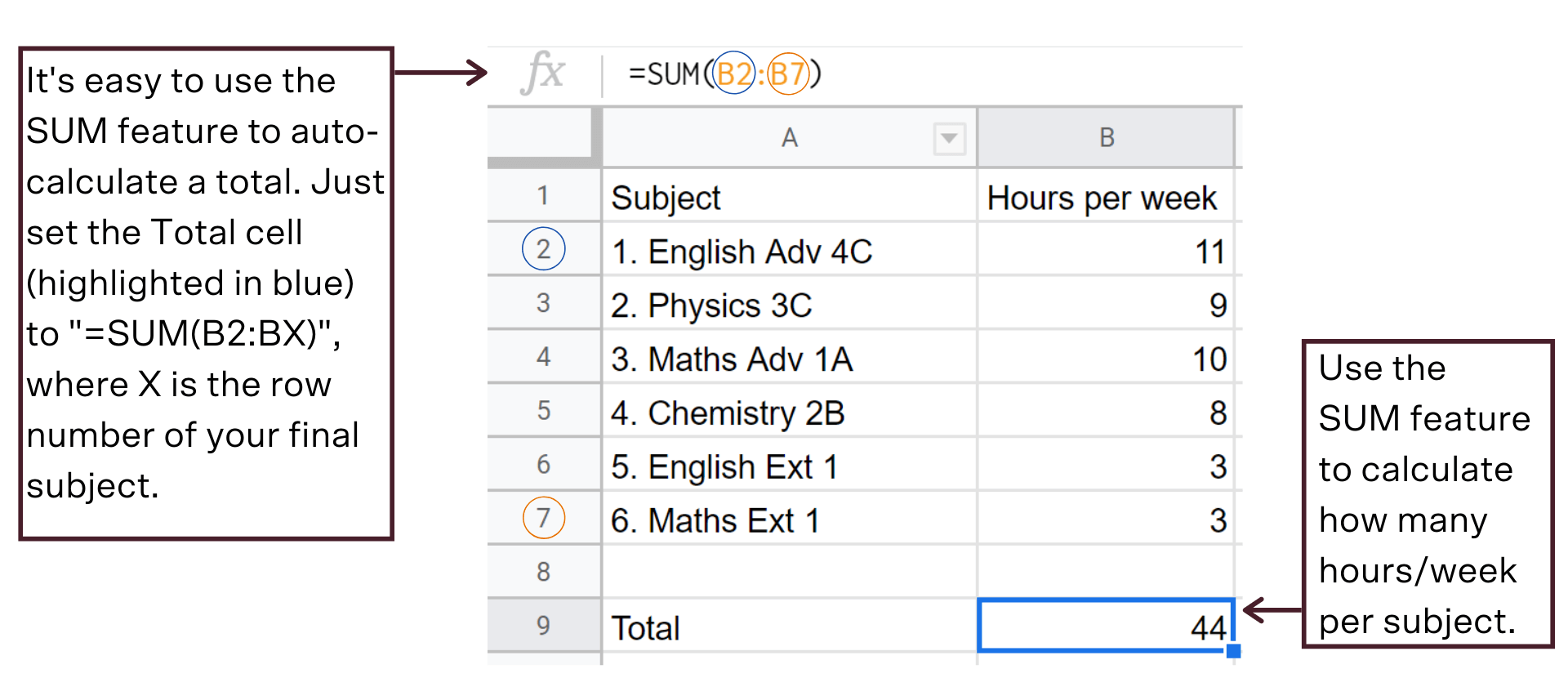
If you’re wondering how to weigh how much time you should place to each subject, try adding 1.5 hours for each unit for the most urgent subjects and taking that away from the weakest. Then, for the other units work down 1 hour and then 30 minutes per unit. (It won’t be perfect, but it is a great guide!)
This is the hardest part of setting up your timetable. The last thing to do before you put it all together is to set some study goals.
Let’s see how to do that, now.
Study is overwhelming unless you break it down into manageable chunks.
You’re not going to achieve much by sitting down and attempting to do an English Paper 1 and Paper 2 and read a novel in one sitting. On their own, sitting practice papers and rereading English texts are admirable study goals – you all should be aiming to to do that! But trying to CRAM it together, you’ll end up tired an irritable, won’t learn, and probably recall less. Instead, you need to break these kind of goals up over a series of days and weeks.
So, how do I do this? ¯\_(ツ)_/¯
First, list all the study goals you have each subject in a table. For example, consider the following to do list:
| English Adv | Maths Adv | Physics |
| Paper 1 practice each week | Sketch practice graphs for MA-T3 | Motion of projectiles/ Gravitational fields |
| Paper 2 practice each week | 2019 HSC paper | Past Baulko Trial papers each week |
| Reread CM text | MA-C4 practice questions (anti-derivatives) | Answer inquiry Questions for Mod 8 |
| 4 scaffolding drills for Mod B each week | Past Ruse Trial Papers each week | 2019 HSC paper |
Next, you want to break down each subject into a set of weekly goals.
| Physics weekly goals | |||
| Week 1 | Week 2 | Week 3 | Week 4 |
| Motion of projectiles | Gravitational fields | Electromagnetic spectrum | Light: Wave model |
| Baulko 2019 Trial Paper | Baulko 2020 Trial Paper | HSC 2019 Trial Paper | Ruse 2019 Trial Paper |
| Mod 8 inquiry q: origin of elements | Mod 8 inquiry q: nature of Atom | Mod 8 inquiry q:Properties of nucleus | Revise Mod 8 Inquiry Qs |
Then, when you’re populating your study timetable you can segment those further within your daily goals!
Remember, when planning study goals aim for realistic outcomes, not dreams. You want to achieve your aims, not be disheartened and increasingly stressed because you failed to meet your targets.
Now you’ve got your time allocations and study goals, you’re able to put it all together!
Now, we’re ready to write up a study timetable for the next month. First, we have to set some rules for how we allocate things:
That might seem like a lot of rules, but they’re important. The most important ones are the first and last. At least one day off and,
Create a routine and stick to it!
First you should set up a broad planner that has key daily goals on it for the month. It might look like this:
| Tuesday | Wednesday | Thursday | Friday | Saturday | Sunday | Monday | |
| Week 1 | Paper 1 Eng Adv | Maths Ext 1 2019 | Chem 2019 | ||||
| Week 2 | Maths Adv 2019 | Physics 2019 | Paper 2 Eng Adv | ||||
| Week 3 | Ruse Maths Ext 1 Trial | Baulko Eng Ext 1 Trial | |||||
| Week 4 |
You want to plan things around an 8 hour day. 7 hours work and 40 minutes for lunch and morning tea. It might help to break your day into 7 50-minute blacks with a 10 minute breather between each subject, or maybe you’ll have shorter breathers and a longer mid-afternoon break. So, you may want to start from a timetable that looks like this:
| Table: An example of how to structure a week’s timetable | |||||||
| Week 1: | Mon | Tues | Wed | Thurs | Fri | Sat | Sun |
| 9-9:55 | Subject: Goal: |
Subject: Goal: |
Subject: Goal: |
Subject: Goal: |
Subject: Goal: |
Subject: Goal: |
R&R |
| 10-10:55 | Subject: Goal: |
Subject: Goal: |
Subject: Goal: |
Subject: Goal: |
Subject: Goal: |
Subject: Goal: |
R&R |
| Morning tea | |||||||
| 11:20- 12:15 | Subject: Goal: |
Subject: Goal: |
Subject: Goal: |
Subject: Goal: |
Subject: Goal: |
Subject: Goal: |
R&R |
| Lunch | |||||||
| 1-1:55 | Subject: Goal: |
Subject: Goal: |
Subject: Goal: |
Subject: Goal: |
Subject: Goal: |
Subject: Goal: |
R&R |
| 2-2:55 | Subject: Goal: |
Subject: Goal: |
Subject: Goal: |
Subject: Goal: |
Subject: Goal: |
R&R | |
| Afternoon break | |||||||
| 3:15-4:10 | Subject: Goal: |
Subject: Goal: |
Subject: Goal: |
Subject: Goal: |
Subject: Goal: |
R&R | |
| 4:15-5:10 | Subject: Goal: |
Subject: Goal: |
Subject: Goal: |
Subject: Goal: |
Subject: Goal: |
R&R | |
Now it’s your turn. Now you know how to plan out the next 4 weeks of your life, you need to do it! If you need some subject specific advice and help, on the next pages we’ve put together some specific advice for Maths, Science, and English and included some sample timetables.
Don’t forget to to download our study pack with planning templates that you can print out and stick to!
Now, we’ll show you how to plan the next 28 days for English so you can ace your HSC.
© Matrix Education and www.matrix.edu.au, 2023. Unauthorised use and/or duplication of this material without express and written permission from this site’s author and/or owner is strictly prohibited. Excerpts and links may be used, provided that full and clear credit is given to Matrix Education and www.matrix.edu.au with appropriate and specific direction to the original content.